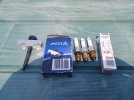The Ibiza is coming up to 6 years old and 22k miles and I reckoned it was time for another air filter change and a first spark plug change ! The car is a 2019 1.0 tsi 110hp 6 speed.
The 3 new plugs supplied by ECP were NGK IKER7A8EGS pn 94224. Do not get them mixed up with ILKER7A8EGS which are the long nosed versions for the 1.5tsi.
The reason for posting this thread is to highlight the fact that the original plugs from the factory had corroded (the steel plug threaded noses had rusted) in place and were very difficult to remove. I have never experienced this before and had to use a torque wrench as a lever and more force than I felt comfortable with. The new plugs went in OK with a drop of engine oil on the thread and torqued to 20Nm and a little nip.
The upside is my coil pack removal tool an Asta A-P061C was really useful. Below is an image of the rusty old spark plugs, new spark plug box and coil pack removal tool :
The 3 new plugs supplied by ECP were NGK IKER7A8EGS pn 94224. Do not get them mixed up with ILKER7A8EGS which are the long nosed versions for the 1.5tsi.
The reason for posting this thread is to highlight the fact that the original plugs from the factory had corroded (the steel plug threaded noses had rusted) in place and were very difficult to remove. I have never experienced this before and had to use a torque wrench as a lever and more force than I felt comfortable with. The new plugs went in OK with a drop of engine oil on the thread and torqued to 20Nm and a little nip.
The upside is my coil pack removal tool an Asta A-P061C was really useful. Below is an image of the rusty old spark plugs, new spark plug box and coil pack removal tool :



